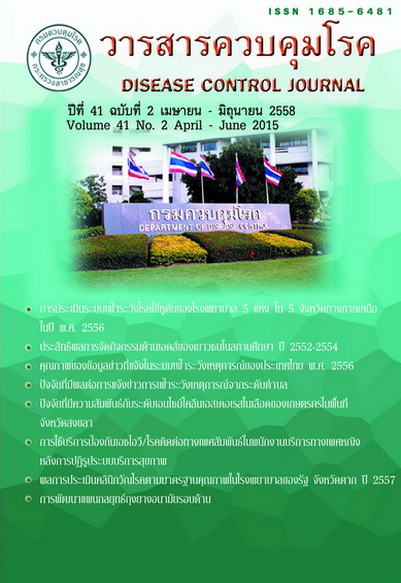Data quality of event-based surveillance reports, Thailand, 2013
DOI:
https://doi.org/10.14456/dcj.2015.20Keywords:
event-based surveillance, data quality, syndrome, reportAbstract
In 2011, Thailand established an event-based surveillance system and a web-based application for reporting events from sub-district level. Two years later, many events had been reported but the quality of data was of concern. A cross-sectional study, with multi-stage random sampling, was undertaken between July and December 2014 in order to identify characteristics and examine quality of the information reported in 2013. Statistical analyses were performed by MS Excel 2007 and Epi Info 3.4 software. A total of 110 39,788 reports were reviewed and the most common syndrome reported was illness of gastrointestinal tract (35.1896), followed by dengue diseases (31.4396). The reporting rates were high during February to Sep¬tember. Every province had at least one report and the median number of reports was 297. Majority (55.5896) of reports were from north-eastern region. The data cleaning of 883 sampled reports identified the actual events for 99.5596 of the total. After verifying by the event-based surveillance criteria including event definitions, reliability, urgency, importance, and signal, the number of events dropped to 27.6396, 27.6396, 10.6296, 8.7296 and 8.2796, respectively. Eventually, the number of events suitably reported was only 73 of which their quality and characteristics were significantly different from the entirely reported events in terms of syndromes, data source, timeliness, region and report month, and outbreak detection. The effective report management and improving events capture, at sub-district level, are critical for quality enhancement and increased data utilization at lower number of reports.
Downloads
References
2. วันชัย อาจเขียน, โสภณ เอี่ยมศิริถาวร, นิภาพรรณ สฤษดิ์อภิรักษ์. การจัดตั้งระบบเฝ้าระวังเหตุการณ์ในประเทศไทย พ.ศ. 2554-2556. วารสารควบคุมโรค 2557;40:222-32.
3. ลดารัตน์ ผาตินาวิน, บุญโรม มาตรา. ประเมินผลการใช้โปรแกรมคอมพิวเตอร์แจ้งข่าวเหตุการณ์ผิดปกติทางสาธารณสุข โดยเครือข่ายระดับตำบล. วารสารควบคุมโรค 2556;39:82-91.
4. สำนักระบาดวิทยา. สรุปรายงานการเฝ้าระวังโรค ประจำปี 2556. กรุงเทพมหานคร: ชุมนุมสหกรณ์การเกษตรแห่งประเทศไทย; 2557. หน้า. 202-5, 209-14.
5. วันชัย อาจเขียน. แนวทางปฏิบัติงานเฝ้าระวังเหตุการณ์ระดับตำบล. ใน: นิภาพรรณ สฤษดิ์อภิรักษ์, บรรณาธิการ. แนวทางการดำเนินงานเฝ้าระวังเหตุการณ์ของ SRRT เครือข่ายระดับตำบล. กรุงเทพมหานคร: ชุมนุมสหกรณ์การเกษตรแห่งประเทศไทย; 2555. หน้า. 1-24.
6. Madoff LC. ProMED-mail: An Early Warning System for Emerging Diseases. Clin Infect Dis [internet]. 2004 [cited 2012 Apr 5);39:227-32. Available from: http://cid.oxfordjoumals. org/
7. คณะกรรมการบริหารจัดการระบบข้อมูลสุขภาพ กระทรวงสาธารณสุข. สรุปผลการดำเนินงานการปฏิรูประบบข้อมูลสุขภาพ กระทรวงสาธารณสุข ระยะเร่งด่วน (มิถุนายน - 30 กันยายน 2557) [อินเทอร์เน็ต]. [สืบค้นเมื่อ 29 ธ.ค. 2557]. แหล่งข้อมูล: https://www.scribd.com/doc/ 246424741/สิ่งที่ส่งมาด้วย2-สรุปผลการดำเนินงาน.pdf
8. Dagina R, Murhekar M, Rosewell A, Pavlin BI. Event-based surveillance in Papua New Guinea: strengthening an International Health Regulations (2005) core capacity. WPSAR [internet]. 2013 I cited 2014 Dec 2 71; 4:1 - 7. Available from: http://ojs.wpro.who.int/ojs/index.php/wpsar/ article / view / 9 9 / 319
Downloads
Published
How to Cite
Issue
Section
License
Articles published in the Disease Control Journal are considered as academic work, research or analysis of the personal opinion of the authors, not the opinion of the Thailand Department of Disease Control or editorial team. The authors must be responsible for their articles.






